Veronika Lovrits is a Doctoral Researcher in Linguistics (Multilingualism). She explores the social effects of talk about talk in a multilingual workplace and their implications for HR management and education. Her independent project work, under the supervision of Prof. Dr. Sabine Ehrhart, merges perspectives of critical sociolinguistics and language-sensitive management. She joined the Luxembourg academia in 2017, after 15 years of professional experience from disadvantaged neighbourhoods in the Czech Republic. She has experience in quantitative and qualitative data analysis, legal case management, and low-threshold counselling. She lectured in schools and projects for social workers, teachers and the public, also participated in policy development, organised workshops, and published in local, national, and international media. She holds a JUDr. degree in Law and Legal Studies (CZ), a combined BA degree in Sociology and Social Policy and Social Work (CZ), and an MA degree in Learning and Communication in Multilingual and Multicultural Contexts (LU). Since 2020, she has been teaching critical metalinguistics at the University of Luxembourg, in the Master of Learning and Communication in Multilingual and Multicultural Contexts, the Master in Border Studies and the Bachelor in Education. Veronika is Associate Fellow of Advanced HE (certified junior teacher in higher education) and Associate Partner in the project “Enhancing language education in cross-border vocational education” at the European Centre for Modern Languages of the Council of Europe. She is also an active member of two professional networks, GEM&L – Groupe d’Études Management & Langage (Strasbourg) and Bilingualism Matters Luxembourg.
Research interests: Multilingualism, Workplace, Human resources, Communication, Lifelong learning, Sociolinguistics, Education, Qualitative research
- You are a researcher in the field of multilingualism and communication with a degree in Law and Legal Studies. What inspired you to turn to your current research field?
I started to explore multilingualism after I moved with my family from Czechia to Luxembourg in 2011. We were already a bilingual family, but with four more languages actively used in the Luxembourg public life, I soon became enthralled by the language complexity of everyday communication. Since I have always had a soft spot for sociology, in which I also have an undergraduate degree, critical metalinguistics has grown into my new professional passion. In the end, law, sociology and linguistics have a lot in common, so it was actually not such a big change as it may seem. All turns around normativity and legitimacy of human actions.
- What studies are you currently involved in? Are they somehow related to terminology? Can you elaborate?
I teach metalinguistics of multilingualism and tutor student projects at the University of Luxembourg in three programs – in the Master in Border Studies, the Master in Learning and Communication in Multilingual and Multicultural Contexts, and the Bachelor in Education. Our students have diverse backgrounds, coming to the university from Luxembourg and many other countries. They learn how to enhance their metalinguistic awareness and deal with social diversity and change without losing their professional and personal integrity.
Setting terminology clear is the first step we have to do in every new course in order to be able to communicate over the borders set by our varied linguistic repertoires, previous studies, academic cultures and professional experience. My scientific and pedagogical focus is language as life practice, not a language as an abstract system. So, terminology is my tool rather than a research object.
- How relevant do you think terminology is nowadays? Why?
On the one hand, clear and concise terminology is crucial for any intellectual field – both as part of philosophy of science and a specific field of practice – from law to medicine, engineering, communication technologies or professional translation, you name it. We cannot move forward in knowledge if we are not one about what we are talking about. On the other hand, the main function of language in any society is social cohesion. So, in everyday communication, our ability to manage emotions and relationships is more important for our social well-being than any sort of linguistic precision.
Understanding the differing functions of professional linguistics (terminology) and everyday communication frees us from an unnecessary fear of “making mistakes” and “losing face” in our dailiness. At the same time, though, we do ask for a professional linguistic service when we need it! And should be ready to pay a fair price for it. That applies to terminology, translation, interpretation … or law, for that matter. Yes, we can treat our problems based on our common sense or a doctorate from Google, but serious matters need a professional.
That said, we should remember that being a “native speaker” is not an expert linguistic skill. Native-speakerism denigrates the work of professional language workers. We are not born terminologists or proof-readers even if we have always lived in one language only. We have to learn how to do that correctly. Besides, some of us simply have a talent or passion for other things.
- How familiar are you currently with the studies on terminology?
Terminology studies seem to be more popular in some European countries than others, namely in Italy, Romania, Sweden, France or Greece. The University of Luxembourg also offers terminology and translation courses. Members of TermCoord share their expertise in those courses too and Luxembourg students can apply for an internship in the terminology team and use their newly gained knowledge directly in practice. I have attended some of the classes led by the TermCoord members and I can tell the lecturers do an excellent job. However, terminology does not have its own program here, unlike in the previously mentioned countries.
- Do you think terminology studies should be separate university studies or rather combined with other studies and/or disciplines?
In my opinion, this decision is an administrative or political one. Terminology can stand for an anchoring point for combined disciplines as well as be an integral part of one discipline. Both can work well in practice. In any case, understanding the key difference between the term and the concept is indispensable for interdisciplinary research.
- During your studies and your Study Visit in the Terminology Coordination Unit of the European Parliament, what was your overall impression of TermCoord?
I have been following activities of TermCoord with a more or less concentrated focus since 2018. It has always been clear to me that people are happy to work there. More people apply to join the team than is possible to engage. Staff in the internal obligatory mobility scheme have always been clear they would prefer to stay in TermCoord. And for the trainees, the unit is certainly a dream placement! As a study visitor, I was positively impressed too. I can imagine many terminology careers have started as a passion revealed in TermCoord.
- Are you familiar with the IATE database? Do you find it useful for your research and your classes?
Yes, IATE is user-friendly, constantly updated, coordinated in a professional way, and all that free of charge! Translators in social circles around me use IATE daily. That said, legal translators in any European country should not hand in an output without consulting terminology in this database. IATE is a great tool and should be part of European translation standards.
- Can you tell us about your current research?
My research explores what is effective communication in the multilingual workplace. I follow workers and managers for a longer time and ask them to repetitively reflect on how they use language and why. It turns out that, even in a friendly ambiance in general, people still tend to talk about languages and speakers in a way that hurts. Without even meaning to be unkind, they actually poison their communication, their colleagues then start feeling excluded, lonely and sad. However, a long-time investigation has further shown that the negative effects can be prevented or healed when people start to talk openly about the ways they experience language and communication. Also, more reflective guidance is needed to realize the nature of concepts behind some terms that are rooted in monolingually governed spaces, for instance the previously mentioned problem with the “native speaker” notion. The most important measure is to open up about affective reactions linked to language.
- What are your research plans for the future?
My mission is to raise critical metalinguistic awareness about communication in multilingual environments. In a short-term, I will continue to publish my findings in academia. My long-term goal is to bring research on everyday metalanguage to the public and also to make critical metalinguistics a topic of language teacher training across Europe and beyond. I am fortunate to be a member of professional networks where evidence-based reflective dissemination is possible – I am an Associate Partner in the project “Enhancing language education in cross-border vocational education” at the European Centre for Modern Languages of the Council of Europe, a member of the Groupe d’Études Management & Langage Strasbourg, and a grounding member of the Luxembourg branch in the Bilingualism Matters network. Since my colleagues support my vision of change, I believe we can make a change together. We will be happy if the readers feel inspired to follow us in social media and check our website Bilingualism Matters Luxembourg: https://www.bilingualism-matters.org/network/bilingualism-matters-luxembourg.
- Is there a question you wish we had asked you?
Maybe I could share one revelation I made when collaborating with TermCoord? I wondered how it is possible that the core TermCoord team could bear the constant change of colleagues with such a grace and composure. I have realized that it is because they treat everybody as if they should keep seeing each other for the rest of their lives – even though the new person should only work for the next three weeks together with them. It is a heart-warming experience! I believe this approach can be a great inspiration for everybody, but particularly for workplace management in global urban spaces with high workforce mobility.

Interview by Monyck de Sá Santos
Born in Rio de Janeiro, Brazil, in 1997. She completed her BA in Languages – Portuguese, English and Literatures at Veiga de Almeida University. She moved to Luxembourg in 2021 for her current Masters degree in Learning and Communication in Multilingual and Multicultural Contexts at the University of Luxembourg. Her working languages are Portuguese, English, French and Spanish. She is passionate about education, teaching, translation and communication. She was a Portuguese and English teacher for 6 years and worked as a translator for 1 year. She was a Study Visitor in TermCoord in the communication department in April 2022.

